The United Nations Information Centre, Tokyo (UNIC Tokyo) and 108 Japanese media companies in the SDG Media Compact have announced the launch of “Promise of 1.5°C. Act now to stop global warming”, a campaign to leverage the power of the media to call for climate actions.
This is the world’s first country-level joint campaign by media companies that are members of the SDG Media Compact, which is a global collaboration framework between the United Nations and media companies.
The objective of this campaign is, through the information dissemination and public engagement by media, to promote understanding of why it is necessary to limit the global average temperature rise to 1.5ºC above the pre-industrial level, to propose concrete actions to stop climate change including global warming, and to encourage individuals and organisations to change their behaviour.
The SDG Media Compact was established by the UN in September 2018 to mobilise the resources and creativity of media organisations and entertainment companies around the world to promote the effort to achieve the Sustainable Development Goals (SDGs). As of 10 June, 279 companies have joined the SDG Media Compact globally. 170 of them are Japanese media companies, accounting for a significant portion of the membership. The “Promise of 1.5°C” campaign, which brings together these media companies’ strengths, is joined by a wide range of media of various sizes, including TV, radio, newspapers, magazines, and online media, and is aimed to call on people across Japan to take action in keeping the “Promise of 1.5°C.”
The campaign title “Promise of 1.5 ºC” symbolises the determination that all individuals and organisations support and act to keep the promises the Parties of the United Nations Framework Convention on Climate Change (UNFCCC) made at the 26th UN Climate Change Conference (COP26) last November. The slogan, “Act Now to Stop Global Warming”, is a message to urge concrete actions to keep the 1.5°C goal alive.
The campaign began on 17 June, and the two-month peak promotional period starts on Monday, September 19, 2022, the first day of the UN High-level Week of the 77th session of the UN General Assembly when heads of state and global leaders gather in New York, USA, through Friday, November 18, the last day (scheduled) of this year’s UN Climate Change Conference (COP27) to be held in Sharm el-Sheikh in Egypt,
Media companies participating in this campaign will enhance public understanding of the reality of climate change through their programs, editorial contents, websites, social media, and events. In addition, they will propose actions to scale up and accelerate climate actions and to show how the “Promise of 1.5ºC” is indeed relevant to every individual and organisation and the participating companies are expected to set more ambitious organisational climate action efforts.
Melissa Fleming, the UN Under-Secretary-General for Global Communications who leads the UN Department of Global Communications, commented, “I welcome this initiative by our office in Tokyo and members of the SDG Media Compact – at a time when action on climate change is a matter of utmost urgency. The science tells us, people’s lives and livelihoods are at stake. The climate crisis threatens all of the Sustainable Development Goals. Our lifestyles have a profound impact on our planet, and all of us can be part of the solution. Japan, as a major greenhouse gas emitter – but also as a great innovator in sustainability, green technologies and energy efficiency – can lead the way. I look forward to seeing this campaign mobilise action across Japan and inspire others to follow suit.”
This campaign is implemented under “ActNow,” the UN’ global campaign to call for climate actions at individual levels.
108 SDG Media Compact member companies have expressed their commitment to the “Promise of 1.5ºC” campaign with this launch. The number is expected to grow in the future.
AICHI TELEVISION BROADCASTING, Akita Asahi Broadcasting, Akita Broadcasting System Inc., AKITA TELEVISION, Aomori Broadcasting Corporation, Aomori Television Broadcasting, Asahi Broadcasting Group Holdings Corporation, Asahi Broadcasting Nagano, Asahi Satellite Broadcasting Limited, bayfm, Broadcasting System of Niigata Inc., BS Fuji, BSS, BuzzFeed Japan, CBC, CHITA MEDIAS NETWORK, Ehime Broadcasting, FM FUJI, FM Kurashiki, Fuji Television, Fukui Television Broadcasting, FUKUOKA BROADCASTING SYSTEM CORP., Fukushima Central TV, Fukushima Television Broadcasting, HBC, Hearst Fujingaho Co., Ltd., Hokkaido TV Broadcasting, Hokuriku Broadcasting, HuffPost Japan, itv, Iwate Asahi Television Co., Ltd., Iwate Broadcasting Co., Ltd., Iwate Menkoi Television, J-WAVE, J:COM, Japan Broadcasting Corporation, KAGOSHIMA TELEVISION BROADCASTING, KAHOKU SHIMPO PUBLISHING Co., Kagoshima Yomiuri Television, Kansai Television, Kodansha, Kumamoto Kenmin Television, Kumamoto Telecasting Corporation, KURASHIKI CABLE TELEVISION Inc., KUTV, MBS, Mie Television Broadcasting, Miyazaki Telecasting Co., ltd., MRT, Nagasaki Culture Telecasting Corporation, Nagasaki International Television, NAGASAKI SHIMBUN, Nagoya Broadcasting Network, New Media, NHK Educational Corporation, NHK Enterprises, NHK Global Media Services, Inc., Nihonkai Television, Nippon Broadcasting System, Inc., Nippon TV, NST Niigata Sogo Television, Co., Ltd., OBC, Okayama Broadcasting, RCC, RKB, RKK, RSK, Ryukyu Asahi Broadcasting, Saga Television, Sakuranbo Television Broadcasting, Seikyo Shimbun, Setonaikai Broadcasting, Shizuoka Broadcasting System, tbc, TBS HOLDINGS INC., Television Nagasaki, Television Osaka, Television Saitama, TELEVISION TSUYAMA Inc., Television Yamanashi, The Asahi Shimbun, THE CHUNICHI SHIMBUN, The Cuisine Press, The Kentsu Shimbun, The Mainichi Newspapers, The Nikkei, The Sankei Shimbun, The Shizuoka Shimbun, The Yamagata Shimbun, The Yomiuri Shimbun, Tokai Television Broadcasting, TOS, TOYAMA TELEVISION BROADCASTING, TSK, TSS, TULIP-TV, TV Asahi, TV SETOUCHI BROADCASTING, TV TOKYO Holdings, TV-U FUKUSHIMA, TV-U Yamagata, tys, UHB HOKKAIDO Cultural Broadcasting, Yahoo! JAPAN, Yamagata Broadcasting, Yamagata Television System, Yamaguchi Asahi Broadcasting, Yamaguchi Broadcasting
The necessity to keep the 1.5ºC goal
Limiting the temperature rise to 1.5ºC above the pre-industrial level was first proposed as an effort to pursue under the Paris Agreement adopted in December 2015. At the 26th UN Climate Change Conference (COP26) held in Glasgow in the UK last November, the United Nations Framework Convention on Climate Change (UNFCCC) Parties reaffirmed this commitment. As described in the special report Global Warming of 1.5ºC published by the Intergovernmental Panel on Climate Change (IPCC) in 2018, keeping global warming under 1.5ºC instead of 2ºC or higher can avoid many of the climate change impacts.
To keep this 1.5ºC target, the IPCC states that CO2 emissions must be reduced by 45% by 2030 from the 2010 level and down to net 0% around 2050 globally, and that emissions of other greenhouse gases (GHG) including methane must also be reduced significantly. According to the update to the National Determined Contribution Synthesis report published by the UNFCCC Office last November, however, with the countries’ current GHG reduction target, GHG emissions will increase by nearly 14% globally in 2030 from the 2010 level.
Reports based on scientific evidence, such as IPCC’s Sixth Assessment Report have become the voice of warning in this state of emergency. The Climate Change 2021: The Physical Science Basis, which is the report published by IPCC Working Group I in August last year, has analysed that the average global temperature has already risen by 1.1ºC and that this rise is attributable to GHG emissions from human activities. Furthermore, the World Meteorological Organization (WMO) has shocked the world by stating in its report WMO Global Annual to Decadal Climate Update for 2022–2026 published in May this year that the probability of the temperature increment exceeding the 1.5ºC threshold over five years between 2022 and 2026 is nearly 50%.
As the escalating climate change is greatly affecting Japan, among other countries, as extreme weather or climate disasters such as heatwaves and large typhoons hit the country almost every year, the IPCC Working Group II report Climate Change 2022: Impacts, Adaptation and Vulnerability published in February this year analysed that climate disasters are expected to become even more intense and frequent in the future.
According to the Emissions Gap Report 2020 released by the United Nations Environment Programme (UNEP) in 2020, Japan is the fifth-largest GHG emitting country in the world. Mobilising climate action through the power of media in Japan is expected to hold a significant impact on the whole world, especially in the current situation where transformative measures to address climate change at all levels of the society are imminently needed.
The Hakuhodo Creative Volunteers supporting the campaign
This campaign is supported by the Creative Volunteers of Hakuhodo DY Holdings Inc., a signatory of the United Nations Global Compact. The campaign title, slogan, statement and logo have been created based on ideas provided by the company’s copywriters and designers taking part in this scheme while taking into consideration opinions of Japanese SDG Media Compact members.
Yuta Iguchi, Creative Director and Copywriter at Hakuhodo DY Holdings commented, “As a consumer, I’m shocked by the fact that the problem has worsened to the point where an attitude of doing things only as far as we can is no longer sufficient. In a wide range of areas including lifestyles and doing business, we need to fundamentally revisit our behaviours and values and change them drastically. That, however, will be the beginning of the new future, I believe. We cannot just continue to endure and struggle.
I hope that a completely new images of our future and positive ideas will be triggered endlessly from this campaign.”
The Association for International Broadcasting is a Member of the SDG Media Compact
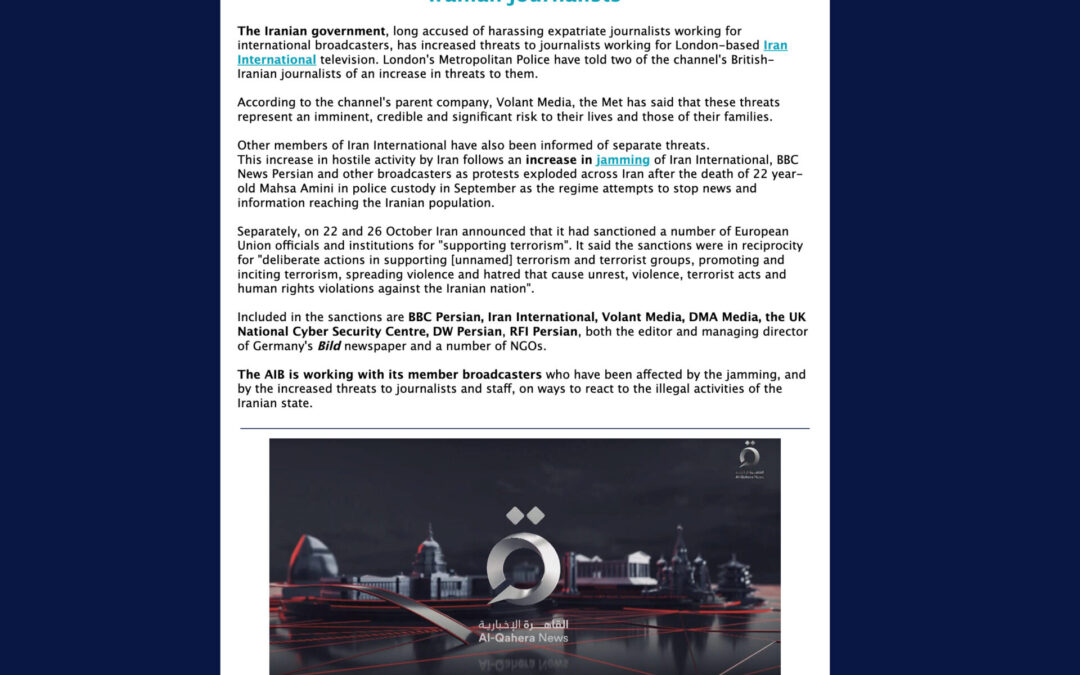

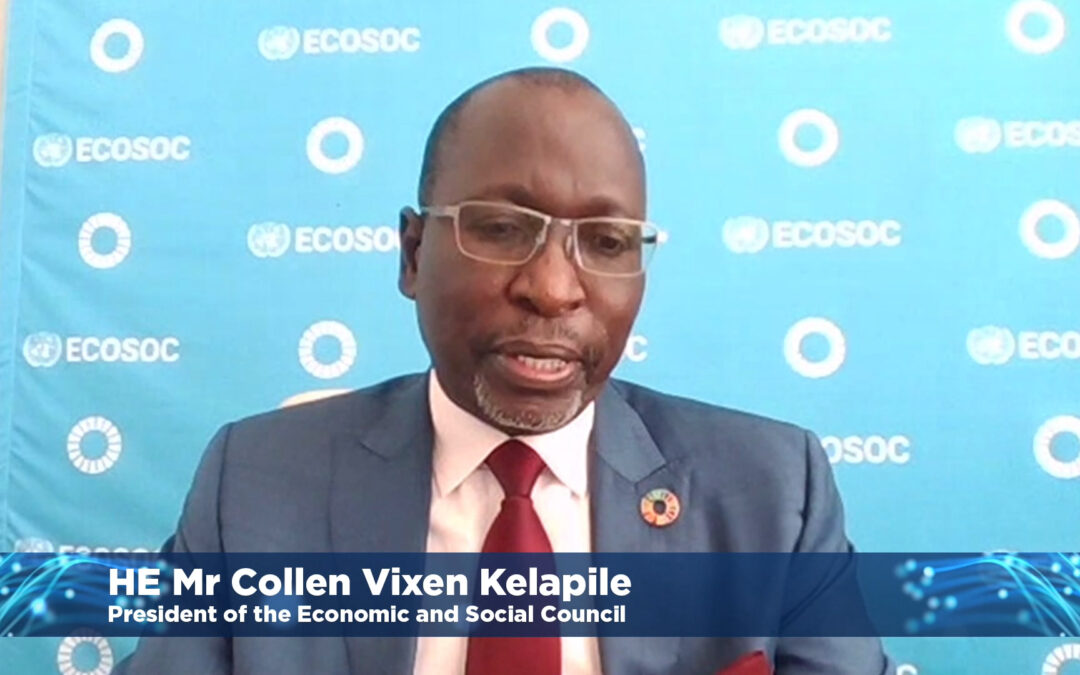

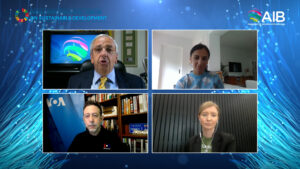

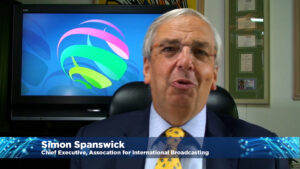

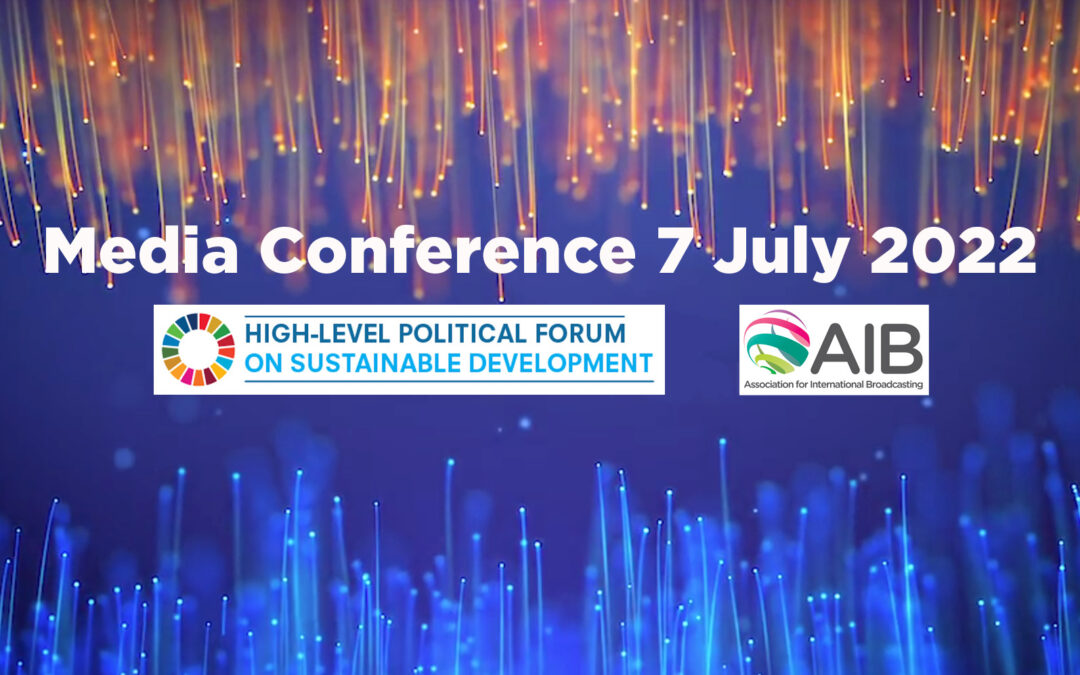
 The conference will be opened by HE Mr Collen Vixen Kelapile, President of the Economic and Social Council of the United Nations. Expert speakers include Aida Sofić Salihbegović,
The conference will be opened by HE Mr Collen Vixen Kelapile, President of the Economic and Social Council of the United Nations. Expert speakers include Aida Sofić Salihbegović, 
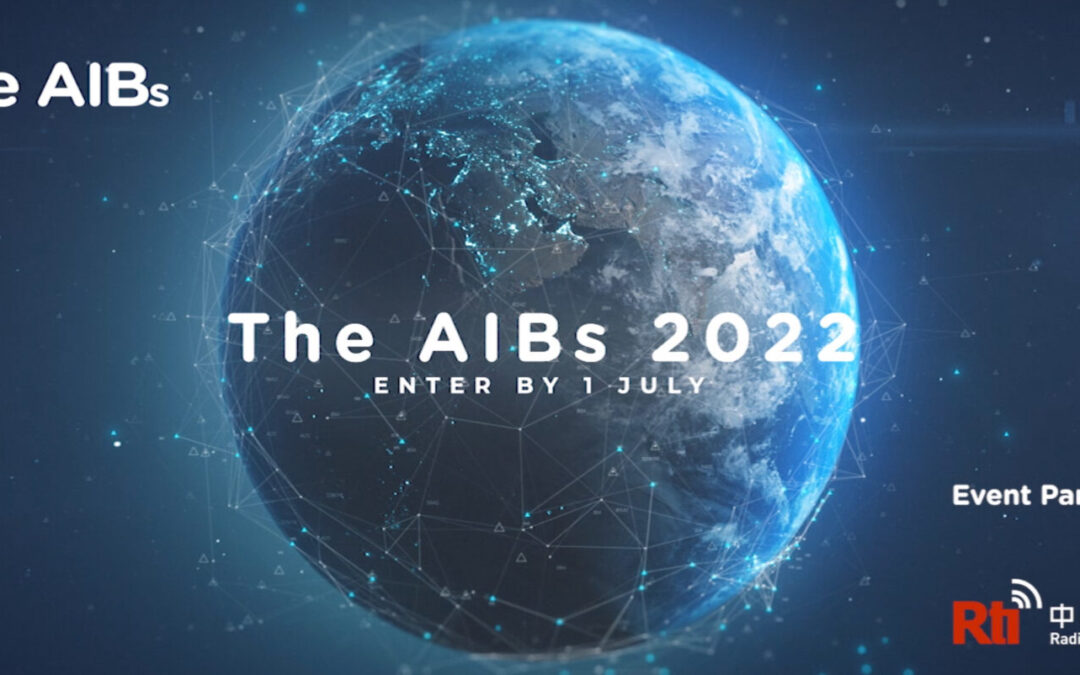
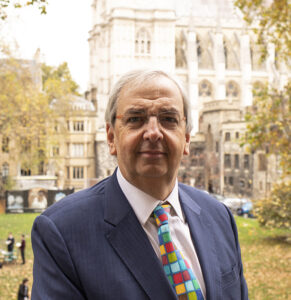 “We are delighted to welcome Radio Taiwan International as the event partner for the AIBs 2022,” says Simon Spanswick, chief executive of the Association for International Broadcasting. “Taiwan has one of the freest media environments in Asia, so it is absolutely fitting that RTI is stepping up to support the AIBs that celebrate journalism and freedom of expression internationally. The partnership with RTI is central to the continuing success and growth of these renowned and respected awards that showcase outstanding news reporting and factual programming from around the world.”
“We are delighted to welcome Radio Taiwan International as the event partner for the AIBs 2022,” says Simon Spanswick, chief executive of the Association for International Broadcasting. “Taiwan has one of the freest media environments in Asia, so it is absolutely fitting that RTI is stepping up to support the AIBs that celebrate journalism and freedom of expression internationally. The partnership with RTI is central to the continuing success and growth of these renowned and respected awards that showcase outstanding news reporting and factual programming from around the world.” Cheryl Lai, Chairperson of RTI, adds: “RTI is committed to freedom of the media as a pillar of democracy. We believe that it is vitally important to support those who are holding truth to power around the world, and to celebrate their essential work. RTI is glad to be partnering with these important awards for journalism and factual programming. We look forward to marking the achievements of some of the world’s best programme-makers who bring the stories that matter to global audiences.”
Cheryl Lai, Chairperson of RTI, adds: “RTI is committed to freedom of the media as a pillar of democracy. We believe that it is vitally important to support those who are holding truth to power around the world, and to celebrate their essential work. RTI is glad to be partnering with these important awards for journalism and factual programming. We look forward to marking the achievements of some of the world’s best programme-makers who bring the stories that matter to global audiences.” The AIBs 2022 will be presented at a gala dinner in London on 11 November. This will be the first live event after a two-year hiatus caused by the pandemic. The AIBs will take place at a new venue, Church House Westminster in the heart of London – right by Westminster Abbey and the Houses of Parliament. The event is traditionally attended by guests from around the world, including key opinion leaders within broadcasting and production companies, and in politics and regulation, alongside journalists, editors, producers, and directors.
The AIBs 2022 will be presented at a gala dinner in London on 11 November. This will be the first live event after a two-year hiatus caused by the pandemic. The AIBs will take place at a new venue, Church House Westminster in the heart of London – right by Westminster Abbey and the Houses of Parliament. The event is traditionally attended by guests from around the world, including key opinion leaders within broadcasting and production companies, and in politics and regulation, alongside journalists, editors, producers, and directors.